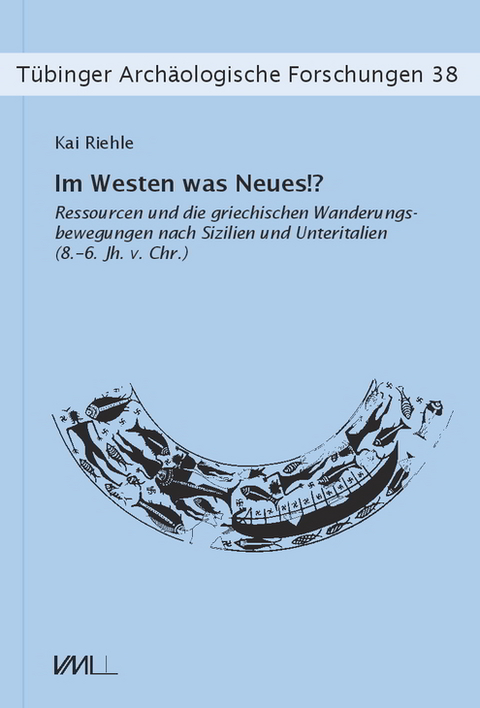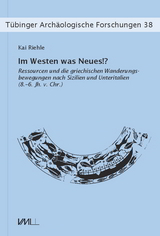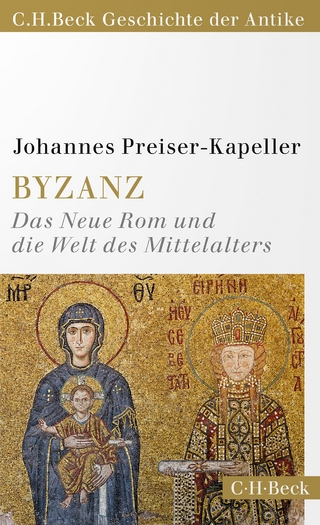Im Westen was Neues!?
Ressourcen und die griechischen Wanderungsbewegungen nach Sizilien und Unteritalien (8.–6. Jh. v.Chr.)
Seiten
2023
|
1., Aufl.
VML Vlg Marie Leidorf (Verlag)
978-3-89646-869-7 (ISBN)
VML Vlg Marie Leidorf (Verlag)
978-3-89646-869-7 (ISBN)
Die sogenannte Griechische Kolonisation umschreibt ein seit langem äußerst kontrovers diskutiertes Forschungsfeld innerhalb der Altertumswissenschaften. In den letzten Jahren kreiste ein gewichtiger Teil der Auseinandersetzungen insbesondere um die Anwendbarkeit kolonialer Konzeptionen auf jene Wanderungsbewegungen, die grundlegende Fragen wie etwa nach den Ursachen der Emigration in den Hintergrund drängte. Die vorliegende Arbeit rückt die Frage der mannigfaltigen Auslöser der griechischen Besiedlung Süditaliens und Siziliens wieder in das Zentrum des Interesses. Unter Rückgriff auf Modelle der historischen und soziologischen Migrationsforschung werden die Bewegungen griechischer Gruppen und Individuen nach Westen als Migrationen aufgefasst und mit einem innerhalb des Tübinger SFB 1070 RESSOURCENKULTUREN entwickelten Konzepts von Ressourcen als Mittel der Bildung, Aufrechterhaltung und Veränderung von sozialen Einheiten im Rahmen kulturell geprägter Interaktion verknüpft. Auf Basis publizierter archäologischer Befunde und unter Hinzuziehung literarischer Quellen werden zunächst die Ausgangssituationen in den Herkunfts- und Zielgebieten untersucht. Den Kern der Arbeit bildet eine Analyse von materiellen und immateriellen Ressourcen, deren Zugang sich entweder maßgebend auf positive Migrationsentscheide auswirkten oder aber, entgegen älteren Annahmen, eine nur untergeordnete Rolle spielten. So wird etwa deutlich, dass Charakterisierungen von griechischen Pflanzstädten als geplante ‚Agrarkolonien‘ und/oder Stützpunkte zum Export von Rohstoffen in das griechische Kernland irreführend sind. Vielmehr ist mit prozesshaften Ansiedlungen über längere Zeiträume zu rechnen, die ganz unterschiedlichen Motivationslagen folgten. Von Bedeutung waren hier insbesondere Aktivitäten, die sich mit Ausbau bzw. der Wiedererlangung von sozialem Prestige und Status in Verbindung bringen lassen; ganz unabhängig davon, ob es sich bei den Akteursgruppen um seefahrende Eliten, oder mobile Keramikhandwerker handelte. Einen wichtigen Faktor bildeten dabei lokal divergierende Kontakte zu den bereits ansässigen italischen und sizilischen Bevölkerungsgruppen, die sich nicht mehr anhand primär ethnisch gezogener Konfliktlinien beschreiben lassen. Die Arbeit bietet somit einerseits eine migrationszentrierte Perspektive auf die Ursachen der griechischen Wanderungsbewegungen nach Sizilien und Unteritalien und stellt andererseits die Vielschichtigkeit sowie den prozesshaften Charakter der Etablierung griechischer Ansiedlungen auf neuem, aber nicht fremden Terrain heraus.
The so-called Greek colonisation has long been a very controversially discussed field in Ancient Studies. In recent years, a large part of the dispute has particularly concentrated on the applicability of colonial conceptions to these migration processes, which has pushed fundamental questions – such as the reasons for emigration – into the background. The present volume re-centres interest on the question of the diverse triggers for the Greek settlement of southern Italy and Sicily. Building on models derived from historical and sociological migration research, the westward movements of Greek groups and individuals are identified as migrations and connected to a concept of resources as means for establishing, perpetuating and changing social units within the framework of culturally influenced interaction, as first developed by the SFB 1070 RESSOURCENKULTUREN at Tübingen. On the basis of published archaeological information and with the aid of written sources, the volume first examines the initial situation in the origin and destination areas. The analysis of material and immaterial resources then forms the core of the book. Access to them either had a decisive influence on positive decisions to migrate or, in contrast to earlier ideas, played only a minor role. For example, it becomes clear that characterisations of Greek apoikiai as planned “agrarian colonies” and/or bases for the export of raw materials to the Greek core territory are misleading. Rather, we have to think in terms of longer-lasting and developing settlement processes which followed very diverse sets of motivations. Especially activities connected to the increase or re-gaining of social prestige and status were of crucial importance; this was entirely independent of whether the actors involved were seafaring elites or mobile potters. A further important factor are locally divergent contacts to the already resident Italic or Sicilian populations, which cannot be adequately described with reference to primarily ethnically defined lines of conflict. Thus, the present volume on the one hand offers a migration-centred perspective on the origins of Greek relocations to Sicily and southern Italy, and on the other hand emphasises the intricacy and the processual character of the establishment of Greek settlements on new, but not foreign territory. The so-called Greek colonisation has long been a very controversially discussed field in Ancient Studies. In recent years, a large part of the dispute has particularly concentrated on the applicability of colonial conceptions to these migration processes, which has pushed fundamental questions – such as the reasons for emigration – into the background. The present volume re-centres interest on the question of the diverse triggers for the Greek settlement of southern Italy and Sicily. Building on models derived from historical and sociological migration research, the westward movements of Greek groups and individuals are identified as migrations and connected to a concept of resources as means for establishing, perpetuating and changing social units within the framework of culturally influenced interaction, as first developed by the SFB 1070 RESSOURCENKULTUREN at Tübingen. On the basis of published archaeological information and with the aid of written sources, the volume first examines the initial situation in the origin and destination areas. The analysis of material and immaterial resources then forms the core of the book. Access to them either had a decisive influence on positive decisions to migrate or, in contrast to earlier ideas, played only a minor role. For example, it becomes clear that characterisations of Greek apoikiai as planned “agrarian colonies” and/or bases for the export of raw materials to the Greek core territory are misleading. Rather, we have to think in terms of longer-lasting and developing settlement processes which followed very diverse sets of motivations. Especially activities connected to the increase or re-gaining of social prestige and status were of crucial importance; this was entirely independent of whether the actors involved were seafaring elites or mobile potters. A further important factor are locally divergent contacts to the already resident Italic or Sicilian populations, which cannot be adequately described with reference to primarily ethnically defined lines of conflict. Thus, the present volume on the one hand offers a migration-centred perspective on the origins of Greek relocations to Sicily and southern Italy, and on the other hand emphasises the intricacy and the processual character of the establishment of Greek settlements on new, but not foreign territory.
The so-called Greek colonisation has long been a very controversially discussed field in Ancient Studies. In recent years, a large part of the dispute has particularly concentrated on the applicability of colonial conceptions to these migration processes, which has pushed fundamental questions – such as the reasons for emigration – into the background. The present volume re-centres interest on the question of the diverse triggers for the Greek settlement of southern Italy and Sicily. Building on models derived from historical and sociological migration research, the westward movements of Greek groups and individuals are identified as migrations and connected to a concept of resources as means for establishing, perpetuating and changing social units within the framework of culturally influenced interaction, as first developed by the SFB 1070 RESSOURCENKULTUREN at Tübingen. On the basis of published archaeological information and with the aid of written sources, the volume first examines the initial situation in the origin and destination areas. The analysis of material and immaterial resources then forms the core of the book. Access to them either had a decisive influence on positive decisions to migrate or, in contrast to earlier ideas, played only a minor role. For example, it becomes clear that characterisations of Greek apoikiai as planned “agrarian colonies” and/or bases for the export of raw materials to the Greek core territory are misleading. Rather, we have to think in terms of longer-lasting and developing settlement processes which followed very diverse sets of motivations. Especially activities connected to the increase or re-gaining of social prestige and status were of crucial importance; this was entirely independent of whether the actors involved were seafaring elites or mobile potters. A further important factor are locally divergent contacts to the already resident Italic or Sicilian populations, which cannot be adequately described with reference to primarily ethnically defined lines of conflict. Thus, the present volume on the one hand offers a migration-centred perspective on the origins of Greek relocations to Sicily and southern Italy, and on the other hand emphasises the intricacy and the processual character of the establishment of Greek settlements on new, but not foreign territory. The so-called Greek colonisation has long been a very controversially discussed field in Ancient Studies. In recent years, a large part of the dispute has particularly concentrated on the applicability of colonial conceptions to these migration processes, which has pushed fundamental questions – such as the reasons for emigration – into the background. The present volume re-centres interest on the question of the diverse triggers for the Greek settlement of southern Italy and Sicily. Building on models derived from historical and sociological migration research, the westward movements of Greek groups and individuals are identified as migrations and connected to a concept of resources as means for establishing, perpetuating and changing social units within the framework of culturally influenced interaction, as first developed by the SFB 1070 RESSOURCENKULTUREN at Tübingen. On the basis of published archaeological information and with the aid of written sources, the volume first examines the initial situation in the origin and destination areas. The analysis of material and immaterial resources then forms the core of the book. Access to them either had a decisive influence on positive decisions to migrate or, in contrast to earlier ideas, played only a minor role. For example, it becomes clear that characterisations of Greek apoikiai as planned “agrarian colonies” and/or bases for the export of raw materials to the Greek core territory are misleading. Rather, we have to think in terms of longer-lasting and developing settlement processes which followed very diverse sets of motivations. Especially activities connected to the increase or re-gaining of social prestige and status were of crucial importance; this was entirely independent of whether the actors involved were seafaring elites or mobile potters. A further important factor are locally divergent contacts to the already resident Italic or Sicilian populations, which cannot be adequately described with reference to primarily ethnically defined lines of conflict. Thus, the present volume on the one hand offers a migration-centred perspective on the origins of Greek relocations to Sicily and southern Italy, and on the other hand emphasises the intricacy and the processual character of the establishment of Greek settlements on new, but not foreign territory.
| Erscheinungsdatum | 31.03.2023 |
|---|---|
| Reihe/Serie | Tübinger Archäologische Forschungen ; 38 |
| Verlagsort | Rahden |
| Sprache | deutsch |
| Maße | 210 x 297 mm |
| Gewicht | 1700 g |
| Einbandart | gebunden |
| Themenwelt | Geschichte ► Allgemeine Geschichte ► Altertum / Antike |
| Schlagworte | Archäologie des Mittelmeerraumes • griechische Kolonisation • Magna Graecia • Migration • Ressourcen • Sizilien |
| ISBN-10 | 3-89646-869-3 / 3896468693 |
| ISBN-13 | 978-3-89646-869-7 / 9783896468697 |
| Zustand | Neuware |
| Haben Sie eine Frage zum Produkt? |
Mehr entdecken
aus dem Bereich
aus dem Bereich
die Inszenierung der Politik in der römischen Republik
Buch | Hardcover (2023)
C.H.Beck (Verlag)
48,00 €




